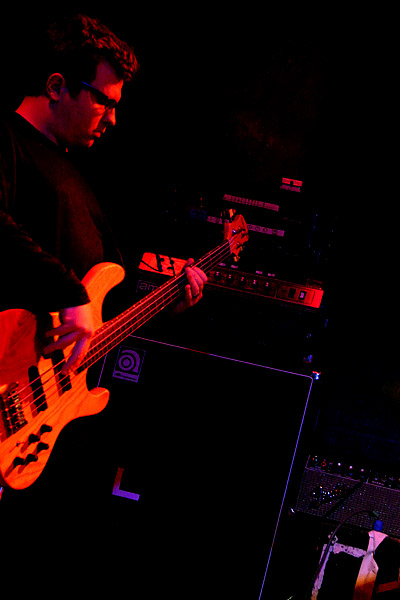
Steve Elkins ~ drums
Matthew Kelly ~ voice, guitar
Frankie Koroshec ~ guitar
Dustin Morgan ~ bass
Jamie Seyberth ~ engineer
Ken Tighe ~ guitar Discography
S/T (2004)
Gift Ep
(2001)
Covers 3" Ep (2001)
Le Carillon (2001)
In The Russet Gold Of This Vain Hour
(2000)
Winter in a Silver Box Ep (1998)
The
Angel Pool
(1997)
Suicide at Strell Park Ep
(1997)
Biography
An old friend of The Autumns used to end his phone calls,
""The Autumns are an empire."" Imperial pretensions aside,
the band's endurance, coupled with the growth of its
audience, truly are remarkable. As the LA Weekly recently
observed: ""Trends may come and go, but the Autumns' staying
power and ever-increasing visibility suggest that a solid
sound and strong resolve beat out a slick, hastily produced
project any day."" When they say ""staying power,"" they're
not kidding. Like any good story, this one starts a long,
long time ago.
Back in 1992, high schoolers Frankie Koroshec and Matthew
Kelly began swapping records and exchanging notes on their
musical idols. Most prominent among them were the Manchester
lot: The Smiths; Trashcan Sinatras; Stone Roses, etc. As
aspiring guitarists, Koroshec and Kelly would spend hours
untangling Johnny Marr's impossible webs of jangling genius.
Soon enough, they found themselves in a large category of
would-be Marr protégés -- a classification only Bernard
Butler seems to have escaped. Indeed, Suede too would play a
seminal role in forging the Autumns' musical mindset.
As with many American youths, college proved a Pandora's box
of musical exposure for Koroshec, Kelly, and their fellow
band-mates. Among others, the Cocteau Twins and My Bloody
Valentine were thrown generously into the mix. By 1997, The
Autumns had drawn their various influences together to
create a unique and identifiable sound -- one that drew an
eclectic mod-to-goth spectrum of twenty-somethings out to LA
nightclubs by the hundreds. That year, the budding and
ill-fated indie Risk Records signed the group, releasing an
EP (Suicide at Strell Park) and full-length album (The Angel
Pool). Both were warmly received. Flipside deemed The Angel
Pool a ""hypnotic pop masterpiece"" and CMJ called the band
""an enlightening unit that knows its past but pushes toward
the future."" The record eventually generated waves big
enough to roll across the Atlantic and brush a figure
critical in the band's own development: Cocteau Twin Simon
Raymonde.
Raymonde heard demos the band had tracked with producer Andy
Metcalfe (Squeeze, Soft Boys) and notified Risk of his
interest. Naturally, the label had little trouble persuading
the band to work with Raymonde. Kelly quickly headed to
London, where the two relaxed on the terrace of September
Sound, sipping red wine over a moonlit Thames and talking
into the morning hours. Kelly recalls, ""It was one of those
moments where you become so convinced that you're dreaming,
you actually sadden at the realization that you're about to
wake up."" But the dream persisted. Within a few months, the
whole band returned to London to begin work on In the Russet
Gold of This Vain Hour, the Autumns' second LP. Things were
looking quite good. Upon its release, the album hung at the
upper end of the college radio charts for weeks on end. LA's
premier ""alternative"" rock station, KROQ, interviewed the
band. The LA Times ran a cover story on them in the Pop
Music section (The Autumns were the big picture, Beck and
Prince were off to the side somewhere). Even MTV got into
the act, turning up at the Troubadour to film an Autumns
show. Then, without warning, Risk Records collapsed, and
with it went Russet Gold.
""Honestly,"" reflects Koroshec, ""it was for the best. That
level of attention made us uncomfortable. And it wasn't the
record to blow up. We were still searching and
experimenting."" The Autumns would continue to experiment
over the coming years. In 2001, they released a four-song,
twelve-minute recording of '50s-inspired love songs on pink
vinyl (Le Carillon). At around the same time, they issued a
limited edition three-inch disc of cover songs (Covers).
Both quickly became scarce, and were received with the usual
esteem. Splendid E-Zine considered Le Carillon ""as refined
as Brian Wilson."" Pitchfork described Covers as
""impressive and inventive"" and Hybrid regarded it as
simply ""superb!"" Meanwhile, Academy Award nominee and
Golden Globe winner Angela Shelton hired the band to score
her movie, Searching for Angela Shelton. The film went on to
garner wide praise, taking numerous festival prizes and
appearing on 48 Hours, Oprah, and the Lifetime network.
When not scoring films or playing shows, the members spent
their time hunkered down in engineer Jamie Seyberth's
(Teenage Fanclub, Beachwood Sparks, The Sugarplastic)
studio, patiently sculpting an ambitious new full-length.
Years after work on it began, the self-titled album was
released to considerably broad acclaim in 2004. The overseas
press found it particularly appetizing. In a four-star
review, MOJO gushed: The Autumns are masters of structure
and dynamics… unutterably beautiful but also hugely
powerful."" The Times of London felt likewise, stating in a
second 4-star review: ""This album has such majestic
chutzpah that the epic gene in you will simply surrender.""
And so they go. With the plaudits stacking up sky high and
yet another wave of converts arriving at their shores, the
Autumns continue to carry the flag of musical independence
with a credibility few artists can match.
|
|


